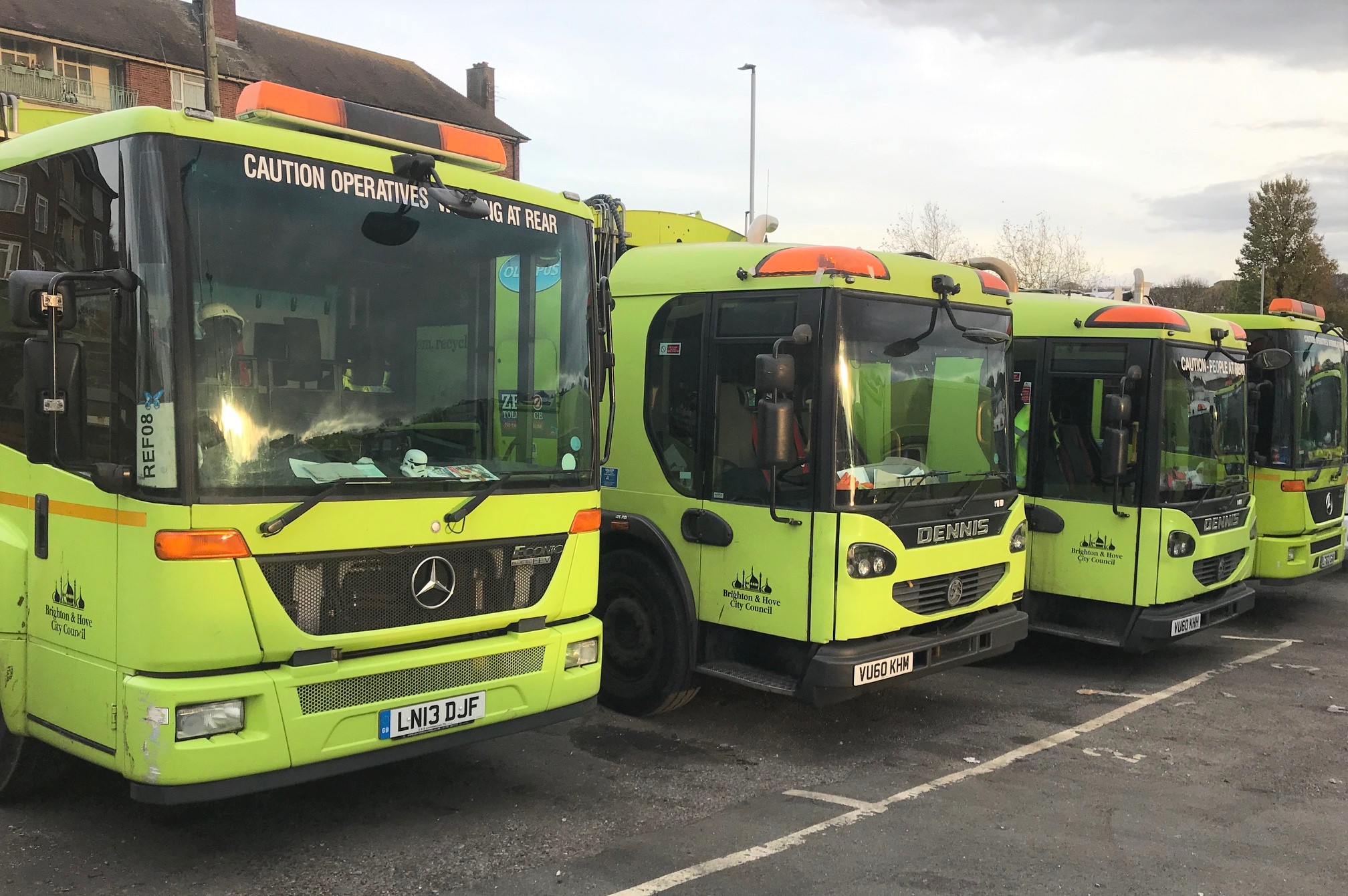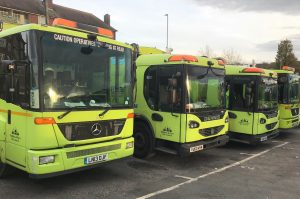Four new rubbish trucks costing more than £2 million could be doing the rounds in Brighton and Hove if councillors agree.
The side-lifting “refuse collection vehicles” (RCVs) run on electric power and would replace four of the five diesel-powered side-lifting trucks that are currently used to empty the biggest communal bins.
The electric RCVs cost £580,000 each, compared with £325,000 for a diesel equivalent, although the council would be eligible for a £25,000 “low emission grant” from the government for each vehicle.
They will be used to empty the largest communal bins – mostly in the centre of Brighton and Hove – which have a capacity of 3,200 litres.
A report to councillors said: “While the costs of electric RCVs are much higher than diesel types, the maintenance and fuel costs will substantially reduce.
“It is estimated that the carbon saving arising from using four electric side-lifting RCVs rather than diesel will reduce the council’s carbon emissions by 10.5 tonnes per annum.”
By comparison, government estimates suggest that the average car emits almost 1.7 tonnes of carbon a year.
Officials at Cityclean, the council’s rubbish and recycling service, also hope that the new trucks will be more reliable than the current ageing bin lorries.
Vehicle breakdowns have been blamed for many of the missed rubbish and recycling collections across Brighton and Hove over the past few years.
The plan to buy the new electric trucks is part of Brighton and Hove City Council’s 10-year “Fleet Strategy”.
The council, which has more than 400 vehicles, including 57 heavy goods vehicles (HGVs) like bin lorries, is aiming to replace its diesel and petrol-powered fleet with electric or hydrogen-powered vehicles.
The report to the council’s Policy and Resources Committee said that the council currently owned 25 electric vehicles.
Two of those were standard rear-loading rubbish trucks, with two more standard electric bin lorries on order.
The report also said that the electrical infrastructure at Hollingdean depot was “currently being upgraded to allow for the increased demand for electricity”.
The depot, where Cityclean is based, already has some solar panels – and the report added: “There are plans for the number of solar panels to be increased as the depot site is redeveloped over the next two years.”
The report to councillors said: “At the time of developing the vehicle replacement plan, the specialist side-lifting vehicles used by Cityclean to empty 3,200-litre communal refuse bins were only available in a diesel model.
“These RCVs are only used by one other local authority in the UK who has the same communal bins system as Brighton and Hove City Council.
“These bin systems and vehicle types are widely used in southern Europe where they are currently transitioning to LPG fuel rather than electric.
“The council owns five side-lifting diesel RCVs to service the city’s communal bins, two of which are near end of life and a further two will need replacing as soon as possible.
“They currently cost, on average, £26,000 per annum to service and maintain. It is not possible to hire this truck type in the UK.
“The vehicle replacement plan anticipated that the council would have to replace these vehicles in 2021-22 or 2022-23 in diesel type and then replace them with low-emission type as technology advances in 2029-30.
“However, there is one company, Terberg, who are partnering with a UK company, Electra, to develop an electric model which is now available to order.
“These are the only manufacturers of electric-powered side-lifting RCVs in the world.
“Production slots for all RCVs are extremely limited globally in the post-pandemic market, with supplies of parts required for vehicle builds in very high demand.
“Further to this, the desire for all local authorities and other countries to accelerate towards carbon neutrality and low-emission vehicles means the demand for production slots are extremely high and likely to become more competitive over the next 10 years.
“If agreed, the council has provisionally secured four production slots for electric-powered side-lifting vehicles – two to be delivered in autumn 2022 and two in 2023-24.”
Officials weighed up other options and the report said: “Four side-lifting RCVs need to be replaced over the next 18 months in order to keep the communal bin collection service operational.
“Consideration has been given to changing the bins system and phasing out these vehicle types, replacing them with cheaper standard electric RCVs.
“However, this is not recommended as this would require smaller 1,100-litre bins to be used on street which are not designed for this purpose and take up more public highways space.
“These bin types are already shown to be unsatisfactory for communal recycling collections and therefore it is not recommended that this approach is also taken for refuse collections.
“Phasing out the communal bins altogether and returning to kerbside collections has been considered.
“It is not recommended that the council returns to kerbside collections in these areas as this would lead to substantial increased cost with more vehicles and staff required.
“Further to this, the kerbside collections in these areas were phased out due to a high proportion of these properties having limited or no storage space for refuse and this resulting in widespread debris being a constant issue in the city centre.
“Purchasing of cheaper diesel side-lifting vehicles is an alternative option costing in the region £325,000 per vehicle.
“This would be with a view to replacing them with electric or another low-emission fuel RCV by 2030.
“However, this is not recommended as the council has an opportunity to move to an electric-type RCV now – and failure to do so will mean that the city does not realise the benefits of lower emissions and cleaner air until a much later date.”
Councillors are also being asked to approve borrowing of £200,000 to pay for an electric fleet for the toilet cleaning service.
They will be asked agree the decisions at the council’s Policy and Resources Committee which is due to meet at 4pm on Thursday (12 May). The meeting is scheduled to be webcast on the council’s website.










It’s a pity these councillors didn’t go to school. If they had, perhaps they’d have learned a few essential facts, such as the fact that carbon is NOT a pollutant, but the basis of life on Earth.
Also, all an electric vehicle does is to transfer it’s energy requirements from the streets to the power station.
We’re being lied to, but most people don’t understand basic physics or chemistry.
Why not buy 1 (one) and test it first who knows might only work for 4hrs because they didn’t factor Muslie mountain hills or the chaps want full on a/c in the summer !
So they are spending £2m (and £600k more then diesel) to save the equivalent carbon footprint of one average resident of the city. They could offset the his for £156 per annum via http://www.ecologi.com and at the same time plant trees for the future.
Have they considered the similar savings from using biodiesel, or even Hydrogen considering their vocal support for a green H2 plant at Shoreham that will also be used by Brighton and Hove Buses?
And what about the additional carbon footprint from new vehicles? The council wants everyone else to support their “circular economy” scheme, and could have considered refurbished Euro 6 vehicles, but at this first attempt it fails miserably 😠
Offsetting is not a panacea. Manifestly, if everyone pays money instead of changing their behaviour, nothing will improve.
But our council proudly throwing our money at solutions that will potentially cause a very minimal reduction (0.0004% of total city carbon emissions) seems just wasteful.
Is this still case of them throwing money at schemes for ideological purposes without identifying whether there are better ways in terms of price performance of achieving this?
Our council still won’t identify what is in scope for their PROMISE of making the city carbon neutral by 2030, not confirm what progress they have made in the 4 years since they made it, and they only have another 8 years to finish the work.
What about all the carbon emissions from residents, businesses, and visitors – for instance, are the city council going to pay for my central heating to be upgraded to a heat pump?
Several other councils have made similar statements but have admitted that achieving net zero is impossible and that offsetting will be needed in terms of getting other carbon absorbing schemes implemented around the globe to solve this worldwide, rather than a local, problem.
If offsetting includes carbon absorption including carbon capture and the move to sustainable energy sources (such as biofuels), can’t this solve much of the problem – or are you demanding lifestyle changes?
Planting trees is key but folk seem keen to avoid the task, preferring to whip out the cheque book!
Unfortunately it takes about 20 years for trees to be large enough to take significant amounts of CO2 (20kg per tree per year) and you need about 500 trees person. The best location for these carbon absorbing trees would be in tropical areas where they grow all year long and where sunshine is almost guaranteed for photosynthesis.
Might go some way to offset the chronic congestion and therefore pollution, that VG3 will bring. Why was the council so against having an independent report on this?
Arguments about carbon footprints aside it makes sense to replace old ones with new ones as they age. Electric might be better especially in our ULEZ which seems to only comprise diesel vehicles. I would hope that the depot also gets fitted with solar panels to reduce demands on traditional power.
So forget the circular economy arguments from the council?
https://www.brighton-hove.gov.uk/rubbish-recycling-and-streets/recycling/circular-economy
The following link is a really interesting listen on electric versus diesel…..I wonder at the so called research…!
https://fb.watch/cWjPhSTnaU/